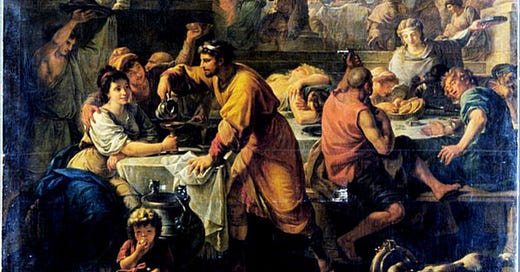As we continue our discussion of global decline using the microcosm of Britain, it seems appropriate to take the time to talk about Saturn. Now, Saturn was not only the god whom the pre-Christian Romans celebrated at this time of year during the midwinter celebration of Saturnalia; he is also the god of time, the elderly, history, tradition, and hard limits, so is especially worth meditating on in contemporary Britain.
Interestingly, however, Saturn was also seen as the ruler of the Golden Age; the generosity and goodwill that was associated with Saturnalia, and later with Christmas, was understood as a way of honouring Saturn by doing one's best to recreate the conditions of the Age over which he ruled. There is an apparent paradox in here that brings some insight; Saturn, as god of hard limits, presided over an age of abundance, a joyful time despite his association with gloomy melancholy. Perhaps the myth of the Golden Age is a memory of a time when we lived within the limits guarded by Saturn, and in return received his gifts of abundance. Santa Claus, distributing gifts to the worthy while soaring through the night-sky, is simply Saturn re-emerging in Christianised European folklore.
As upcoming Dodcast guest Kimberley Steele writes in her thoughtful piece on the return of Saturn, this oft-misapprehended god has some important lessons for those ready to receive them; Saturn “may represent death and dying, but all things must die in order for the new to be born.” The old year perishes as the midwinter sun drops below the horizon, only to begin the cycle again. Embrace the Decline. Those who resist this process will only invoke Saturn's stringent reprisal; those who would attempt to usurp his role, and attempt to impose limits on others to maintain their own positions of privilege and luxury, will invoke his harsh wrath.
Another Claus, in this case one of the Schwabby variety, is a clear example of the latter. Much like Ebeneezer Scrooge, who receives the harsh lessons of Saturn (in the form of the Ghosts of Past, Present, and Future, evoking Saturn in his role as Old Father Time) in Dickens's A Christmas Carol, Klaus Schwab and his cronies represent the miserly, money-grubbing, and geriatric elites. It is they who would impose a 'carbon-tax' on your Ford Fiesta, but not their private jets; who would prevent you from installing wood-burners, while their houses all have at least three; who would have you eating cricket-chipolatas on a Christmas zoom call with your family, while their masked attendants carve the organically-reared turkey.
Saturn, however, always gets the last laugh. “Limits for thee, but not for me” is not an attitude that goes over very well with Old Saturn, famed for his microscopic precision in administering justice. Schabby Klaus would, quite frankly, be lucky to get a lump of coal in his stocking this year, given the energy crisis.





JM Greer uses the analogy of a bird's flight - it's so powerfully beautiful because the bird acts within its limits. It doesn't try to overshoot them.
William Blake actually said something similar despite his anti-nomian rep.!